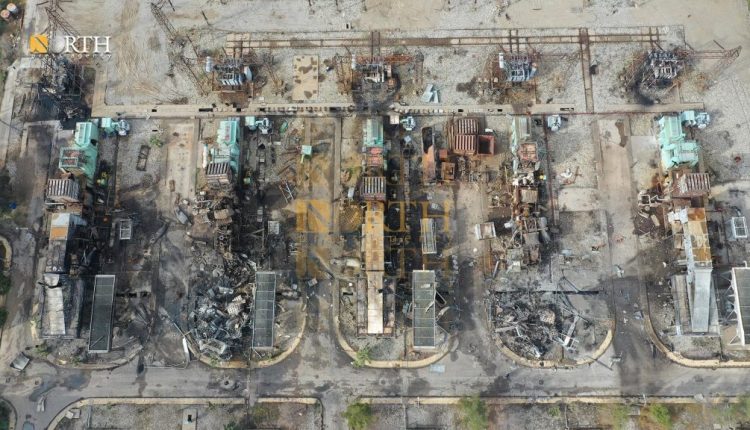
By Dilsoz Youssef
QAMISHLI, Syria (North Press) – Signs of a humanitarian crisis have emerged a few days after Turkey halted its attacks on vital infrastructure facilities in northern and northeastern Syria. This crisis is manifested in a severe shortage of basic services for the region’s inhabitants, most notably water, fuel, gas, and electricity.
Standing in front of his store in the city of Qamishli, northeastern Syria, Milad Sobhi describes the impact of the Turkish strikes on their areas as a “tragedy”.
In an interview with North Press, he said it is hard to secure water without electricity because people depend on water pumps to fill their household tanks. “In addition, we also have no gas. I was shocked when someone told me today that the price of a gas cylinder exceeded $20.”
Sobhi wonders how the poor would eke out a living with the acute shortage of basic life needs.
Turkish forces launched intensive attacks using warplanes and drones for five consecutive days on northern and northeastern Syria, starting on January 12, targeting vital infrastructure and service facilities.
These attacks disrupted the production of oil and gas, in addition to causing water shortages and the suspension of some hospitals and mills. Six people were injured in the attacks, according to a statement by the Autonomous Administration of North and East Syria (AANES).
Local residents fear that the situation will worsen amid the ongoing collapse of the Syrian pound (SYP), especially since they already face difficulties in securing basic life needs.
Sobhi noted that their suffering is much worse than what media covers.
On the parallel street near his shop, 70-year-old Abdul Karim Ahmad, who works as a hawker, called out the “hypocritical” Turkish state. He said that Turkey is trying to exterminate people by cutting off water, electricity, and gas. The war is deemed unacceptable in all religions and laws.
With great anger, he added to North Press that the region’s people will bear the brunt of this destruction, but “Turkey must know that we will not abandon our homeland and migrate.”
Officials in the AANES stated that they are unable to repair the oil, and gas facilities after the massive destruction caused by the Turkish bombardment.
Agid Abdulmajid, director of the Sweidiya gas plant, told North Press that the initial cost of repairing the facility is estimated at $1 billion.
These attacks have sparked anger in the local community, which has taken to the streets in large protests, with calls for the international community to stop these attacks.
Berivan Omar, an AANES official, said that they are struggling to secure drinking water for the local population after power stations went out of service, which used to supply electricity to the wells that feed the region with water.
Omar explained that they rely on electricity generators to operate the wells, adding that it is difficult to rely on generators due to malfunctions and constant need for fuel, which has become scarce after oil facilities went out of service.
She further emphasized the need for assistance from abroad, stating that the repair of the damage caused by the Turkish strikes requires expertise and equipment that are not available in northeastern Syria.
On Jan. 18, Abeer Khaled, Deputy Co-chair of the General Directorate of Fuel in northeastern Syria, told North Press that they are seeking to import the region’s energy needs, “but it will come at a high cost.”
Oil refineries and wells used to provide fuel to more than five million people, according to AANES, she said.
Abbas Musa, a member of the Synergy/Hevdesti Association, a victims’ advocacy group in northeast Syria, emphasized the pressing need for international support in reconstructing the region’s already vulnerable infrastructure.
In a statement to North Press, he explained that the Turkish bombardment has severely hindered the ability of the AANES to meet the region’s demands for water, electricity, and gas.
The scarcity of these essential resources has a profound impact on the lives of the population, emphasizing the necessity of international intervention for their restoration.
The AANES condemned in a previous statement what it called an “international silence” regarding the Turkish attacks.
It called on the international community and humanitarian NGOs to rehabilitate the destroyed facilities and support stability in the region.
Hassan Kocher, Deputy Co-Chair of the Executive Council of the AANES, stated in a previous interview with North Press that the international silence on Turkish attacks is evidence that they stand in solidarity with Turkey in its bombardment on the region, despite the fact that these attacks violate international laws.
Abbas Musa believes that the international community tends to separate political issues from humanitarian concerns.
He said that from a political standpoint, there are many considerations. “For example, the U.S.-led Global Coalition has not issued any deterrent statements against Turkey [because member states are allies with Ankara].”
However, Musa believes that the international community can still take humanitarian action by leveraging the presence of the many international NGOs operating in AANES-held areas.
